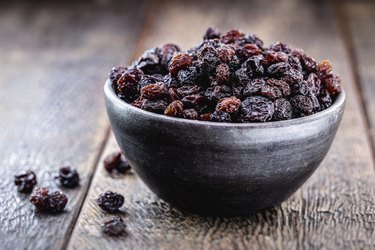
Raisins contain more iron than many other types of fruit. However, whether they deliver a high percentage of your daily value depends on the portion you eat, as well as your gender, because women need double the iron as men.
Tip
A typical serving of raisins — one small box — contains 0.8 milligrams of iron. However, it doesn't qualify as a high-iron food based on regulations from the U.S. Food and Drug Administration (FDA).
Video of the Day
Amount of Iron in Raisins
The Office of Dietary Supplements recommends those who are premenopausal consume 18 milligrams of iron daily, while others (including postmenopausal people) need 8 milligrams every day.
Video of the Day
Based on these requirements, a small box provides 4 percent of the recommended daily allowance for menstruating people and 10 percent for other adults. But to be considered a high source of nutrients, a food must provide 20 percent of your recommended daily allowance, according to the FDA.
This means raisins — at 0.8 milligrams of iron per one small box — provide a high source of iron only if eat 2 to 4.5 small boxes.
How to Boost Iron Absorption
Raisins contain a type of iron called non-heme iron. The amount of non-heme iron absorbed during digestion is affected by a variety of substances naturally found in foods. For example, phytic acid in legumes and grains interferes with iron uptake. So if you eat raisins with wheat bran flakes, your body will absorb a smaller amount of the iron.
On the flip side, vitamin C almost doubles the absorption of non-heme iron. To get the most iron from raisins, rinse them down with a cup of orange juice or eat them with other vitamin C-rich foods, such as strawberries, sweet potatoes and pineapples.
Benefits of Iron: Energy and Immunity
Iron is best known for its presence in red blood cells. From there, it carries life-sustaining oxygen to cells and tissues in your body. When you don't get enough iron in your diet, red blood cells don't develop properly and they have less hemoglobin, which means they can't deliver enough oxygen.
Iron-containing compounds fill other essential jobs in your body, such as metabolizing energy and synthesizing DNA. Your immune system also depends on iron. It's required for the normal growth of white blood cells, and iron-dependent enzymes help produce antioxidants that protect the cells of your immune system.
Risks of Iron Deficiency
Iron deficiency interferes with your ability to stay physically active, as muscles won't have enough oxygen and you'll quickly become fatigued. Some iron is stored in your liver, so when you don't get enough through your diet to meet normal daily losses, your body pulls it from storage.
If your diet consistently lacks sufficient iron, the stores are eventually depleted and anemia develops. Those who are pregnant have an increased risk for iron deficiency. During pregnancy, the recommended dietary allowance increases to 27 milligrams daily to support the increase in blood volume and to meet the iron needs of the developing baby, per the Mayo Clinic.
- USDA Nutrient Database: "Raisins, Dark, Seedless"
- U.S. Food and Drug Administration: "Appendix B: Additional Requirements for Nutrient Content Claims"
- Linus Pauling Institute: "Iron"
- Centers for Disease Control and Prevention: "Recommendations to Prevent and Control Iron Deficiency in the United States"
- Laboratory Medicine: "Iron Deficiency Anemia in Patients Undergoing Extracorporeal Photopheresis for Cutaneous T-Cell Lymphoma"
- Journal of the American Dietetic Association: "Iron nutrition and absorption: dietary factors which impact iron bioavailability"
- Mayo Clinic: "Iron deficiency anemia during pregnancy: Prevention tips"